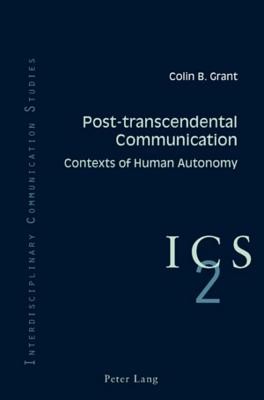
- We will send in 10–14 business days.
- Author: Colin B Grant
- Publisher: Peter Lang UK
- ISBN-10: 3039110322
- ISBN-13: 9783039110322
- Format: 15.2 x 22.9 x 1 cm, minkšti viršeliai
- Language: English
- SAVE -10% with code: EXTRA
Post-transcendental Communication; Contexts of Human Autonomy (e-book) (used book) | bookbook.eu
Reviews
Description
Compared with other human and social sciences, communication theory appears to be of recent origin. Appearances deceive, however, for the antecedents of this growing field of work can be found in the classic philosophical treatises of western and non-western thinkers including Plato, Sextus Empiricus and Laozi, reaching forward through the theolinguistic tradition of St Augustine, Boethius, Averroës and Ockham before arriving at the modern age. Following Wittgenstein's linguistic turn and Husserl's phenomenology in the early decades of the twentieth century, we arrive at the fertile plains of semiotics, information theory, pragmatics and dialogism out of which communication theory has grown. And yet an unresolved and historically non-coincidental tension remains between the implicit transcendental claims of much of communication theory and our experiences of risk, uncertainty and dissolution in what Zygmunt Bauman has described as our 'liquid age'. As communication theory matures, it is an opportune moment to reflect on what form a detranscendentalised theory of communication might take. In bringing intentions, understandings, meanings and interactions down to earth this book invites its readers to account for the complex communications between communications, actors and social processes without recourse to transcendental theories of understanding.
EXTRA 10 % discount with code: EXTRA
The promotion ends in 22d.07:53:19
The discount code is valid when purchasing from 10 €. Discounts do not stack.
- Author: Colin B Grant
- Publisher: Peter Lang UK
- ISBN-10: 3039110322
- ISBN-13: 9783039110322
- Format: 15.2 x 22.9 x 1 cm, minkšti viršeliai
- Language: English English
Compared with other human and social sciences, communication theory appears to be of recent origin. Appearances deceive, however, for the antecedents of this growing field of work can be found in the classic philosophical treatises of western and non-western thinkers including Plato, Sextus Empiricus and Laozi, reaching forward through the theolinguistic tradition of St Augustine, Boethius, Averroës and Ockham before arriving at the modern age. Following Wittgenstein's linguistic turn and Husserl's phenomenology in the early decades of the twentieth century, we arrive at the fertile plains of semiotics, information theory, pragmatics and dialogism out of which communication theory has grown. And yet an unresolved and historically non-coincidental tension remains between the implicit transcendental claims of much of communication theory and our experiences of risk, uncertainty and dissolution in what Zygmunt Bauman has described as our 'liquid age'. As communication theory matures, it is an opportune moment to reflect on what form a detranscendentalised theory of communication might take. In bringing intentions, understandings, meanings and interactions down to earth this book invites its readers to account for the complex communications between communications, actors and social processes without recourse to transcendental theories of understanding.


Reviews